Celebrating Excellence: Seattle University Honors Outstanding Alumni
Written by Mike Allende, Andrew Binion, Mark Petterson, Tina Potterf and Mike Thee
Friday, March 28, 2025
/142x0:2258x1350/prod01/channel_34/media/seattle-university/news-amp-stories/magazine/winter-2025/38thAlumniAwardsv2.jpg)
From trailblazing professionals to community champions and athletic legends, this year’s Alumni Award recipients embody the spirit of Seattle University’s Jesuit mission.
This year’s Alumni Award winners, including the newest inductees into the Athletics Hall of Fame, are inspiring, remarkable individuals who embody the best of Seattle University. They are leaders in their professions and dedicated in service to others, to the university and the community.
Meet this year’s recipients, who were honored at a formal ceremony on February 28. They are:
• Alumna of the Year: Kim Shirley, ’88, ’91 JD
• Outstanding Recent Alumna: Keisha Jackson, ’14 MA
• University Service Award: Joe Blaschka, ’73
• Professional Achievement Award: Mari Horita, ’99 MNPL
• Community Service Award: Alison Francis, ’24
• Jesuit Mission Award: Sister Rosalie Locati, ’66
• Athletics Hall of Fame: John King, ’91
• Athletics Hall of Fame: Alex Roldan, ’18
Kim Shirley, ’88, ’91 JD
Alumna of the Year
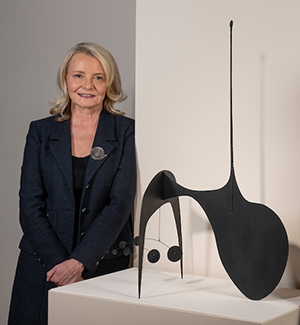 Kimberly Richter Shirley, ’88, ’91 JD, was caught off guard when she heard she had been named Alumna of the Year.
Kimberly Richter Shirley, ’88, ’91 JD, was caught off guard when she heard she had been named Alumna of the Year.
“I was surprised and deeply honored and a little emotional,” says the retired attorney and art maven, who along with her husband, Jon Shirley, are renowned art collectors known for their contributions to art access in Seattle and beyond.
Those contributions include establishing in 2023 the Shirley Family Calder Collection at the Seattle Art Museum, where Shirley serves as a trustee. The gift includes the bequest of 48 pieces of Alexander “Sandy” Calder’s work from the Shirleys collection, as well as funding for an annual exhibition of the sculptor’s works and works related to him. It also includes educational funding and an endowment.
Even closer to her SU home, the Shirleys were key supporters of the specialized art collection at the Sinegal Center for Science and Innovation.
“For us, art access is really important, especially for young people,” she says. “So, we were really excited about the idea of this gorgeous building and that we could have an input into what the students would be viewing.”
Though art is her passion, something she was exposed to as an undergraduate on the East Coast, Shirley’s career path took her first into government, where she served as staff in both the U.S. House of Representatives and the U.S. Senate.
“At the time, in the mid-1980s, without a graduate degree, it was really almost impossible to find anything other than clerical work,” she says. “I decided to go back and get more education and I was very interested in accounting.”
She returned to Seattle to study first accounting at the Albers School of Business and Economics, drawn to its outstanding academic reputation, then earned her JD from the Seattle University School of Law, preparing her for a career as a tax attorney.
“It’s a truly strong program with really great students and incredible professors,” she says.
Citing the influence of her husband on her evolving tastes in art, Shirley says she is drawn most to sculpture.
“There's something really wonderful about being able to walk around a sculpture and to see it from all the different angles, but I also always loved painting,” she says.
In recent years, as part of the President’s Committee on the Arts and the Humanities, Shirley worked to help preserve historical records and artifacts from natural disasters. Former President Joe Biden appointed her to the committee, which worked with federal agencies on cultural projects to benefit Americans.
"I've always been very impressed with Seattle University’s commitment to art and to include artwork in its buildings, because that's a real commitment."
—Kimberly Richter Shirley
When deadly wildfires roared through Lahaina on Hawaiian island of Maui in 2023, it sent a wakeup call not just about the vulnerability of communities, but of cultural heritage in the age of climate change. The committee worked on emergency plans with FEMA to help save and preserve priceless pieces of American heritage when disaster strikes.
“That’s very important to me,” she says.
Shirley says SU is taking its place as a major contributor to art and culture in Seattle and the Northwest.
“I've always been very impressed with Seattle University’s commitment to art and to include artwork in its buildings, because that's a real commitment,” she says. “Commitment of money and time and of people.”
She cited last year’s gift of the Hedreen Collection, made up of more than 200 works of art dating from the 15th century to today, as an extraordinary step in making art more accessible to the campus and larger community.
“It’s a gift to the university, a gift to the students and a gift to the city,” she says.
A nominator for Shirley to be Alumna of the Year wrote: “It is difficult to imagine anyone more deserving or whose life work is more closely aligned with the university’s strategic vision and values, particularly as we prepare to establish a campus art museum to serve our students, community and surrounding schools.”
—Andrew Binion
Keisha Jackson, ’14 MA
Outstanding Recent Alumna
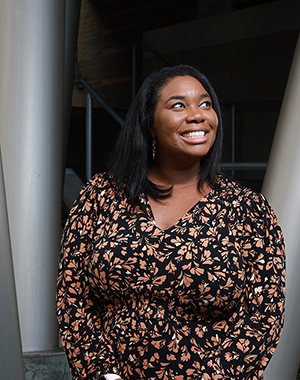 Keisha Jackson, ’14 MA, is no stranger to connecting people. She’s made a career out of it in various roles with Microsoft.
Keisha Jackson, ’14 MA, is no stranger to connecting people. She’s made a career out of it in various roles with Microsoft.
Currently, Jackson serves as the Global Lead of the Innovative Educator Experts and Showcase Schools programs and supervises the Technology Education and Learning Supports (TEALS) program’s regional managers. The TEALS team works to connect K-12 educators to tech professionals in the community and help develop computer science programs in schools across the Western and Central U.S.
But Jackson, this year’s Outstanding Recent Alumna—recognized for her career achievements and embodiment of Jesuit values—recalls that her career path was anything but linear.
“It takes a little bit to make the connection,” she says, “but once you see it, the connections are all there.”
Jackson credits her time in the Student Development Administration (SDA) master’s program at the College of Education as a key moment in her unexpected trajectory.
“I always knew that I wanted to work in education,” she says, so the SDA program at Seattle University was a natural fit. The program also offered a strong research component and an interdisciplinary approach to leadership that really resonated.
At SU, Jackson found a tight-knit community and inspiring faculty. Her advisor, Dr. Erica Yamamura, guided her through a research project focused on the mentoring experiences of women of color in higher education. In addition to her research Jackson also served as a course assistant for Dr. Alvin Sturdivant, gaining valuable experience in interdisciplinary learning.
"The combination of research skills and what I learned about myself as a leader were all stepping stones that led me to my role at Microsoft."
—Keisha Jackson
Jackson vividly remembers an assignment in leadership principles in which students were asked to find a photo that represented the essence of leadership.
“I took a picture of myself in a mirror with the words, ‘The Person in Charge of My Future’ written on it,” recalls Jackson.
The professor, Dr. Tim Wilson, used the photo as an example for the rest of the class. “Ms. Jackson understood the assignment,” she remembers him saying.
Several years later, she found herself at Microsoft on the TEALS team, and the connections began to make sense. “The combination of research skills and what I learned about myself as a leader were all stepping stones that led me to my role at Microsoft.”
For Jackson, connecting with community is not only a professional calling, but a personal one. She currently sits on four professional boards, including SU’s Board of Regents, serving as an ambassador for SU and a connector between the College of Education and the tech world.
Jackson credits her mother for instilling the value of community involvement.
“My mom always underscored the importance of community connection. Seeing the impact on folks who would otherwise be under-resourced was really important to me,” Jackson explains.
Balancing a demanding career with community engagement isn’t easy, but Jackson believes it’s essential.
“I was so appreciative of working with students during my time at SU. I learned so much from them,” she says. “It only made it more important as I progressed in my career to continue investing in communities.”
—Mark Petterson
Joe Blaschka, ’73
University Service Award
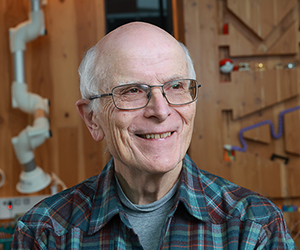 Looking back at his time as an engineering student at Seattle University, Joe Blaschka, ’73, believes he wouldn’t have made it at any other college.
Looking back at his time as an engineering student at Seattle University, Joe Blaschka, ’73, believes he wouldn’t have made it at any other college.
Burning the candle at both ends, Blaschka and his wife, Linda, had a young child—the first of three—and were managing an apartment building on Capitol Hill as Blaschka studied engineering full time and worked a part-time job repairing electronics.
Anywhere else besides Seattle University, he figures his struggles would have been met with a shrug. “They just would've said, ‘Too bad, so sad.’”
The support he received, not just material support in the form of work-study jobs to help ensure his tuition bills were paid, but also mentoring and tutoring especially by the late engineering Professor Emeritus Richard Turner, PhD, made it possible for him to graduate and embark on a career. Blaschka founded and ran his own communications engineering firm, ADCOMM Engineering, assisting rural counties upgrade and operate state-of-the-art public safety communications systems such as 911 dispatch.
That’s why for Blaschka it’s so important to do his part, especially for engineering students.
“I really wouldn’t be where I’m at today if it hadn't been the support Seattle U had given me,” he says. “And I thought I really need to give back.”
Always on the go and well invested in community-building—his first volunteer gig was as a junior high youth minister with St. Brendan’s Parish in Bothell—he has long been immersed in the College of Science and Engineering with an emphasis on serving students.
The university also holds a special place in his heart even beyond his own experience. Both of his parents graduated from Seattle University and of his four grandchildren, one is an alumnus and another is currently on campus studying chemistry.
If he wasn’t helping his alma mater he would likely be helping elsewhere.
“It's the payback to Seattle U, but also I think it's just great,” he says. “People underestimate how good it makes you feel to help somebody.”
"People underestimate how good it makes you feel to help somebody."
—Joe Blaschka
Blaschka has served on the Electrical and Computer Engineering's Advisory Board for more than a decade, wrapping up his term as chair, and is currently a member of the Leadership Council for the College of Science and Engineering. He’s also been hands on with students, mentoring with the college and helping with mid-year project reviews, the Best Poster Awards Committee and by faithfully attending Projects Day. He also emphasizes engaging first- and second-year engineering students, exposing them to industry professionals.
College of Science and Engineering Dean Amit Shukla, PhD, lauds Blaschka for his tireless dedication.
“His focus on our Jesuit mission inspires all of us and is a testament to the impact of SU on our alumni,” says Dean Shukla. “Our College of Science and Engineering is better prepared to serve our stakeholders because of alumni such as Joe Blaschka.”
On being named the recipient of the University Service award, Blaschka says he was stunned and for a moment figured somebody made a mistake.
“I’ve been to several of the award ceremonies and I always looked at the people who got those awards and thought, ‘Wow, those people really contributed a lot to Seattle U, that's pretty cool,’” he says. “Never in my wildest dreams would I have thought that I would be up there.”
—Andrew Binion
Mari Horita, ’99 MNPL
Professional Achievement Award
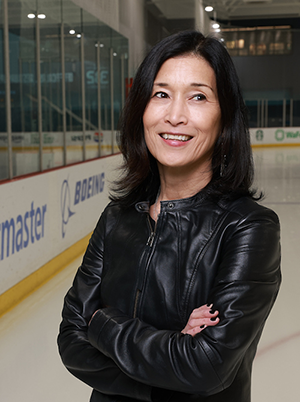 Mari Horita smiles when she hears about diverse groups of fans feeling accepted and welcomed at Seattle Kraken hockey games. It’s not just because as the National Hockey League franchise’s Senior Vice President of Social Impact and Civic Affairs, it’s her job to ensure everyone feels like they belong cheering on the team.
Mari Horita smiles when she hears about diverse groups of fans feeling accepted and welcomed at Seattle Kraken hockey games. It’s not just because as the National Hockey League franchise’s Senior Vice President of Social Impact and Civic Affairs, it’s her job to ensure everyone feels like they belong cheering on the team.
It’s because she grew up learning what being made to feel like you don’t belong is like.
The 2025 Professional Achievement Award winner, Horita grew up in Seattle learning how her dad Akira and mom Lillian suffered as part of anti-Japanese actions taken by the United States during World War II. In particular, at age 11 Lillian and her family spent three years in barbed-wire enclosed encampments in California and Idaho.
It left an imprint that has carried over throughout her career, first as a lawyer, then leading a regional nonprofit and now with the Kraken.
“When you realize what happened to your parents, are you kidding me? There are a lot of emotions from sheer rage to profound sadness and frustration,” Horita says. “One of the reasons I became a lawyer was to better understand the judicial system so I could help people falling victim to it. My parents’ experiences influenced that decision and the internal sense of trying to work to build community. I have to believe it stems from that.”
After earning a bachelor’s degree in Asian Studies from Pomona College and a JD from the University of Washington, Horita practiced law for several years before being drawn to the nonprofit world. She earned her Master’s in Nonprofit Leadership from Seattle University in 1999.
In 2012 Horita left law to lead a large strategic transition as President and CEO of ArtsFund, a nonprofit whose mission is to support “the arts through leadership, advocacy and grantmaking in order to build a healthy, equitable and creative Washington.” For someone pulled toward community-building and the arts—she’s played violin for more than 25 years—it was a great fit.
But when the expansion NHL team the Kraken came calling in 2019 as they were putting together their organization, it was too good of an opportunity for Horita to pass up as she was looking for a bigger platform to help make a difference. And it doesn’t get too much bigger than professional sports. Still, as someone with no background in hockey, she wasn’t sure at first how she’d fit in. But she quickly fell in love with her job, the organization and the sport.
“Sports is something we get really emotionally invested in and it’s powerful in that sense,” she says. “In this job we’ve been able to redefine our own hockey culture so that it is inclusive and welcoming to everyone.”
Hockey hasn’t always been that way, but Horita says it was clear from the start that the Kraken are committed to building an inclusive community that reflects the city and region the team represents. “We’re all in,” Horita says. “I feel very fortunate to work for leaders who authentically appreciate why it’s important.”
"In this job we’ve been able to redefine our own hockey culture so that it is inclusive and welcoming to everyone."
—Mari Horita
In addition to her work with the Kraken, Horita is also executive director of the One Roof Foundation, which focuses on addressing systemic challenges and uplifting underrepresented communities. She also serves on the boards of United Way of King County, the Seattle Metropolitan Chamber of Commerce and the Board DE&I Committee for the Downtown Seattle Association.
Her time at Seattle University played a big role in her growth, helping her dive deeply into the role and history of nonprofits, social issues, being engaged, partnerships and the power of service. Along with her parents’ story, it helped make her who she is today.
“When you’ve been excluded in a very extreme way, you’re very aware of how important a welcoming community is,” she says. “Everyone needs a purpose, whatever that is. And a big part of is this larger ‘How can I be a part of building and making this community better?’”
Being recognized with the alumni award for Professional Achievement Horita says she is honored “to be recognized by this institution that is dedicated to improving the human condition and shaping a better world for all. Beyond the mission of the school, so many of the people I respect and admire the most—people who have supported and believed in me—are tied to Seattle University. I am eternally grateful.”
—Mike Allende
Alison Francis, ’24
Community Service Award
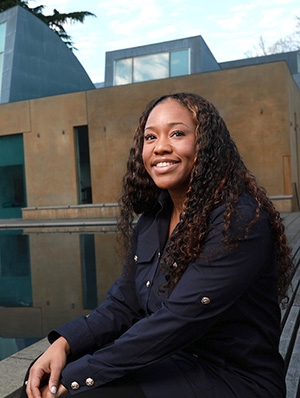 Alison Francis was 16 years old when she got her first job at Costco Wholesale in Issaquah, Wash., thus beginning a relationship that has continued for 27 years. Today, she serves as the company’s Chief Diversity and Inclusion Officer, with her office at Costco’s headquarters just steps away from the warehouse floor where it all began.
Alison Francis was 16 years old when she got her first job at Costco Wholesale in Issaquah, Wash., thus beginning a relationship that has continued for 27 years. Today, she serves as the company’s Chief Diversity and Inclusion Officer, with her office at Costco’s headquarters just steps away from the warehouse floor where it all began.
Francis knows Costco inside-out, having done virtually every job imaginable during a career that brought her to the Southeast, East Coast then back home again. While rising through the company’s ranks, she received a bachelor’s degree from Oakwood University (Huntsville, Ala.), a master’s from Georgetown and this past year completed the Executive Leadership Program (ELP) in Seattle University’s Albers School of Business and Economics.
And she is this year’s Community Service Award recipient in recognition of her achievements professionally and the impact she makes through her work enriching the lives of others.
The award came as a surprise to Francis. “I thought, ‘who would even nominate me?’ I enjoy serving my community because it's my responsibility to give back and help those around me. I'm really humbled and honored. Getting an award from Seattle U is a big deal. It's very meaningful.”
Following her first year at Oakwood, it was touch and go as to whether Francis would continue school. Back home for summer break and working in a marketing internship at—you guessed it— Costco, she wondered if she really needed to further her education in order to advance in her career. One day, while delivering a file to an employee, she happened to pass the desk of Costco co-founder and then-CEO Jim Sinegal and they got to talking about her future. “He gave me really great advice,” she recalls, more or less encouraging her to stay in college.
These days Francis needs no convincing when it comes to the power of education. Even while leading Costco’s diversity, equity and inclusion initiatives, she finds time to serve on the leadership council for the Pacific Northwest chapter of the United Negro College Fund (UNCF), as well as a board member for the Urban League of Seattle. She lights up when discussing UNCF’s various programs to make college a reality for those underrepresented in higher ed. “I love hearing the students talk about what they want to do and supporting that development.”
"I love hearing the students talk about what they want to do and supporting that development."
—Alison Francis
As for her own education, she is a walking advertisement for SU and the Albers School of Business and Economics’ Executive Leadership Program. “The program leads you through a process of really understanding who you are as a leader and helping you identify where you want to go in your company and then in your community,” she says. “Any leader looking to elevate themselves personally—within their organization and within the community—should think about the program.”
“Alison Francis’ leadership in our community is a powerful testament to the mission, vision and values of our university,” says Director of Executive Leadership Programs Ariel Rosemond. “Through her efforts and example, she advocates for access and justice, embodying the highest ideals of her alma mater.”
—Mike Thee
Sister Rosalie Locati, ’66
Jesuit Mission Award
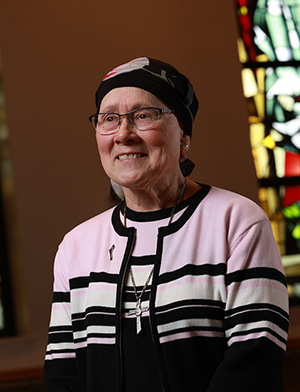 Growing up, Sister Rosalie Locati had little doubt of how her future would unfold. In fact, she prayed on it, each and every day. As a high school student, even as she was engaging in typical high school traditions like being a cheerleader and Homecoming queen, she never lost sight of her plans to become a nun with the Sisters of Providence.
Growing up, Sister Rosalie Locati had little doubt of how her future would unfold. In fact, she prayed on it, each and every day. As a high school student, even as she was engaging in typical high school traditions like being a cheerleader and Homecoming queen, she never lost sight of her plans to become a nun with the Sisters of Providence.
In a sense, it was something percolating since birth.
Born at St. Mary’s Sisters of Providence Hospital in her hometown of Walla Walla, Wash., Sr. Locati attended Catholic school from elementary through high school and two months after her high school graduation she formally entered the convent of the Sisters of Providence (SP), crossing the mountains to do her formation at Sisters of Providence at Providence Heights in Issaquah, Washington.
While there she began her higher education pursuits at Seattle University, graduating in 1966 with a bachelor’s degree in social sciences and minors in philosophy and theology. When she completed her studies she began a teaching career that took her to Missoula, Montana, where she taught second grade at St. Francis Xavier before moving to St. Gerard’s Parish School in Great Falls, Montana to teach third graders for three years before returning to Missoula to teach sixth grade. In total she taught for nine years until 1979, when she was called back to ministry with the Sisters of Providence. This was not her last foray, however, in education. After earning a master’s in theology from St. Mary’s College in California Sr. Locati returned to the state to work in Campus Ministry at Washington State University. Then as a mission integration officer at Providence Sacred Heart Medical Center and Children’s Hospital, a role she served in for 22 years.
In her work leading and supporting others with their faith, she emphasizes valuing the whole person and understanding the human spirit, embodying the traits that make her this year’s Jesuit Mission Award recipient—the first time Seattle University has bestowed such an award.
The foundation for this award is especially meaningful to Sr. Locati. “First of all, I am very humbled by this, surprised and delighted. What really struck me is that it’s a mission award,” she says. “Mission is critical and key to everything—our education, our health care, social services. My understanding and belief are that there is only one mission: the gospel of Jesus.”
During her time in Campus Ministry at WSU, Sr. Locati was working closely with students, leading search retreats, organizing charitable events and helping prepare them as young adults heading out in the world post-graduation. It is an experience that remains among her most treasured.
"Mission is critical and key to everything—our education, our health care, social services."
—Sister Rosalie Locati
“My role was making sure their faith education, personal growth and development would come to fruition,” she says, “and that they left WSU as whole human beings, intent on making the world a better place.”
For Sr. Locati, her work as a woman of faith has been life fulfilling and infinitely rewarding.
“I really believed I was called to serve others, to be there for others, to help others know that they are loved,” she explains. “Every one of my ministries was a challenge but a gift. It really comes down to relationships with people—be it parents, students, children, colleagues—who have touched my life the most.”
A person who nominated Sr. Locati for this award said “she lives the Providence mission to make this a better world,” citing her kindness, gentle nature and real understanding of the human spirit.
“As a Sister of Providence, our main devotion is to reveal God’s love in our actions and in our lives,” Sr. Locati says. “And I believe that God has invited me to live the gospel, so people see and experience it. I feel that is God working through me.”
—Tina Potterf
Athletics Hall of Fame
John King, ’91
Men’s Basketball
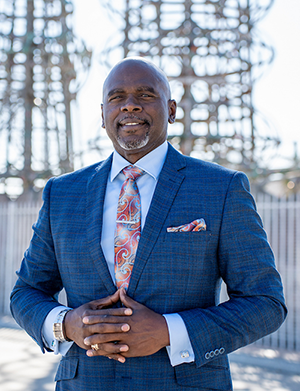 Growing up in Los Angeles, John King seemed destined for a life serving others—with a particular focus on underserved youth and families—in the communities that are dotted throughout his hometown.
Growing up in Los Angeles, John King seemed destined for a life serving others—with a particular focus on underserved youth and families—in the communities that are dotted throughout his hometown.
An interest in working with and providing opportunities for young people first piqued during his time at Seattle University studying criminal justice and an internship at the King County Juvenile Detention center near campus. This experience clicked for him that he could make a real difference working with youth. And it formed the foundation of his later professional life that brought him back home to LA and to a career not only helping youth but also families throughout the city.
While his professional life is rich in achievements (more on that to come), he was also something of a star player on Seattle University’s men’s basketball team. It was basketball, in fact, that originally brought him to Seattle University.
Recruited while a senior in high school, he played all four years on the team, earning a number of accolades that remain today, including #2 all-time in scoring (1,899 points) and in field goals (831), #1 all-time in field goal attempts (1,724) and 5th all-time in rebounds (917).
For his stellar career on the court and his accomplishments off, King is one of the newest inductees into the Athletics Hall of Fame.
“Sometimes in your life’s journey you don’t quite know where it will take you. I feel really blessed to be able to play basketball, to graduate, to work in the community. It shows people that they can do it, too.”
Following graduation, King spent two years in the Seattle area working at the Ruth Dykeman Children’s Center, which supports the mental health and wellness of at-risk youth. This experience only reaffirmed his belief that he was on the right path.
With a desire to return to California, King went to work for the Housing Authority of Los Angeles, where he’s spent the past 27 years, moving up the ranks to his current role as Director of Community Engagement and External Affairs.
“I was always meant to do this work. To say this is my dream job is not an exaggeration,” he says. “If I was able to create a job, I would have drafted it up just like this.”
"I feel really blessed to be able to play basketball, to graduate, to work in the community. It shows people that they can do it, too."
—John King
In the early years of this role King was continuing the work that began in Seattle, overseeing a youth-oriented violence prevention program in Compton, with a focus on providing educational, athletic and other recreational opportunities to keep kids on the right track. As his career progressed, he began continued to work with underserved communities in areas including Watts and Boyle Heights.
One program that connected back to King’s basketball days was the Vocabulary Basketball League, implemented across the city’s public housing communities. Players would get extra points for bringing to the game vocabulary words with definitions. Though the program has since been discontinued, its impact was meaningful and just another way to bridge academics and sports.
With the Housing Authority King works on the ground level, face to face with those who live in the diverse cities and neighborhoods throughout Los Angeles County while he earns their trust and helps meet their most pressing needs. In Watts, for example, he was instrumental in a major public housing redevelopment project. “It’s not just about building housing—it’s about building hope,” King says, noting that this community- and hope-building extends to areas including family services, self-sufficiency initiatives and afterschool programs.
And that feeling of community and belonging harkens back to King’s basketball days. Being part of the men’s basketball team brought King the opportunity to travel and see different parts of the country while also forming friendships with former teammates that continue today. Playing basketball also provided him a memorable but bittersweet moment. During his sophomore year the team traveled to his home state to play the University of Southern California. His whole family turned out to see his return and King recalls looking up and seeing his dad in the stands, decked out in SU gear and cheering on his son—who had one of his best games. Sadly, two weeks later his father would pass away unexpectedly. King, himself a father with two adult children (Nia and Jarrel) with his wife Marlo, is appreciative that his father was able to see him play.
At the end of the year King will retire from his role with the city to focus his time entirely as pastor of Rose of Sharon Missionary Baptist Church, something he’s been serving in as well as holding down his day job. He will be only the second pastor to serve this South Los Angeles church—his uncle was the first. As full-time pastor King will not only prepare sermons but also assist in running the day-to-day of the church.
“John continues to live a life consistent with the Jesuit mission as a leader in his community giving back to those less fortunate,” says Andre Lang, ’95, ’04 JD, men’s basketball alumnus and Hall of Fame committee member who nominated King for the hall. “John was and remains an exemplary representative of the university both on and off the court, conducting himself with humility, class and sportsmanship.”
—Tina Potterf
Alex Roldan, ’18
Men’s Soccer
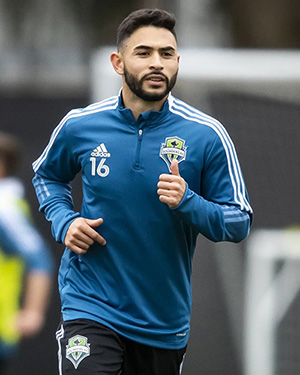 Soccer was always Alex Roldan’s passion, but the 2018 Albers School of Business and Economics graduate and 2025 Seattle University Athletics Hall of Fame inductee didn’t see in his future a career as a Seattle Sounders defender until well into college.
Soccer was always Alex Roldan’s passion, but the 2018 Albers School of Business and Economics graduate and 2025 Seattle University Athletics Hall of Fame inductee didn’t see in his future a career as a Seattle Sounders defender until well into college.
Seattle University offered Roldan a scholarship but it wasn’t until halfway through his four years as a Redhawk—where he showed Iron Man durability, starting every game from 2014 to 2017, 82 in total—that the possibility of playing professionally dawned on him.
As a college player, Roldan had 18 career goals and 17 career assists, making him one of the most prolific scoring defenders in modern NCAA history. In 2016 and 2017 he was named first-team All-WAC and led the Redhawks to three WAC championships.
Largely overlooked by recruiters as a three-year letterman playing soccer for El Rancho High School in Pico Rivera, California, Roldan was considering a partial scholarship at a state school or moving to Arizona to take an offer from a community college. His older brother, Cristian Roldan—now a Sounders teammate—had been recruited to play for the University of Washington.
“I didn't think it was in my cards,” Roldan says. “Obviously, seeing my brother playing professionally gave me more motivation, but I didn't really come to fruition until junior year of college where I really saw myself take some strides and become a better player.”
Roldan’s first steps toward his future as an Athletics Hall of Famer occurred when SU recruiters spotted him at the Surf Cup, a youth soccer tournament in Southern California.
Former Coach Pete Fewing and current Coach Nate Daligcon recruited Roldan, with Fewing saying what immediately stood out about Roldan was “just talent.”
“He had that grit that everybody talks about,” Fewing says, who credits Daligcon, then an assistant coach, with seeing Roldan’s potential. When the two coaches got a chance to talk to Roldan, he made a strong impression, not just as a soccer player, but a well-rounded person.
His junior year saw Roldan lead the team in scoring and during the season Roldan could feel himself taking on a different role.
“I felt like I really elevated as a leader and as a player that would show up in big games,” he says. “I just gained a little bit more confidence and so that's when I realized maybe I do have the potential or I am good enough to be in the league.”
Fewing says the change in Roldan was evident and he credits Roldan’s parents, Cesar and Ana, for instilling values of education and work ethic in their sons.
“I think he just realized he could play,” says Fewing. “He started lifting more and got a lot stronger physically, 10 to 12 pounds of pure muscle.”
During that time, Fewing says Roldan was key in bringing the program what the coach considers two of its greatest NCAA tournament wins—topping UCLA at home and beating crosstown rival Washington.
In the 2018 MLS draft, Roldan was selected 22nd overall by the Sounders. Now in his seventh season with the team, he earned MLS All-Star honors in 2021 and also plays for the El Salvador national team.
As brothers, Alex and Cristian are extremely competitive but at the same time are also each other’s biggest supporters, with Cristian noting that Alex’s calm, laid-back personality combined with natural talent makes him especially formidable as a competitor.
“The occasion is never too big for him,” Cristian says of his younger brother. “He leads by example and always seems ready for every game. I believe his relaxed energy is what makes him so good.”
The brothers are only about 14 months apart in age, a negligible gap that led to them playing on the same teams growing up. Until college, usually the only time they competed against each other was in their backyard.
“College gave us the chance to really compete officially,” Cristian says. “It was great to see him in his element and when he got drafted it became a full circle moment.”
Academics were also important to Alex, who says he had to work hard to earn his degree, something that is a particular point of pride, pointing out, “It is something I will have for the rest of my life.” Following graduation from SU, where he earned his degree in business management, Roldan has continued learning, earning an MBA from Southern New Hampshire University.
"I just gained a little bit more confidence and so that's when I realized maybe I do have the potential or I am good enough to be in the league."
—Alex Roldan
The experience in Albers allowed him to grow close to Dean Joseph Phillips, who reached out personally to congratulate Roldan for his induction into the Hall of Fame.
“A big influence on me joining the Albers alumni has to do with Dean Phillips,” Roldan says. “I give a lot of credit to him and am thankful for him.”
Roldan and his wife, Stacy, are expecting their firstborn soon, a boy they plan to name Luka.
Roldan says his reaction to hearing he had been selected for the Athletics Hall of Fame was gratitude.
“I went from a teenager to a young adult and learned so many valuable things,” he says. “I think this is a recognition of not only what I did on the field, but just what I try to do as a person, especially in the community and hopefully be a role model to others who are striving for some success, whether it is in sports or just graduating from a great institution like Seattle U.”
—Andrew Binion
/0x42:2400x1558/prod01/channel_34/media/seattle-university/news-amp-stories/images/Erin-Martin-para-on-skis.jpeg)
/0x21:1200x779/prod01/channel_34/media/seattle-university/news-amp-stories/images/Ann-Wyckoff-vintage-photo.JPG)
/201x0:2199x1262/prod01/channel_34/media/seattle-university/news-amp-stories/images/Career-Engagement-Albers-Fair.jpg)